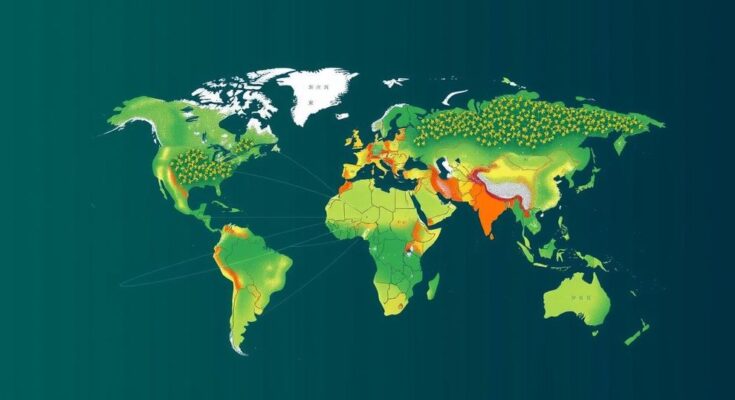Donald Trump’s potential reelection poses serious risks to global climate efforts, with fears that it may lead to a retreat from international agreements like the Paris Accord. Experts highlight the importance of cooperation among major economies, emphasizing that inaction from the U.S. could embolden other countries to diminish their commitments. Despite uncertainties, climate negotiators maintain hope for continued global initiatives to combat climate change.
The potential reelection of Donald Trump raises significant concerns regarding the future of global climate action. During his previous term, the United States’ withdrawal from the Paris Agreement prompted other nations to mitigate the impact; however, experts warn that a second Trump presidency could hinder global efforts even further. Observers note that a diminished U.S. commitment might embolden countries such as China to retreat from their carbon reduction goals, exacerbating the climate crisis. Notably, Stanford University’s Rob Jackson emphasized the necessity of action from major nations to keep global temperatures within safe limits. The imminent United Nations climate negotiations in Baku, Azerbaijan, serve as a critical point for assessing the resilience of the global climate regime. Leaders anticipate that the European Union and China may take on more leadership roles in the absence of robust U.S. participation, particularly given the backdrop of record-high temperatures and extreme weather events across the globe. In discussing potential policy shifts under Trump, experts like Asia Society Policy Institute’s Li Shuo expressed concerns over the enduring impacts on international climate negotiations and cooperation. Additionally, Alden Meyer, a seasoned climate analyst, indicated that the ramifications of possible U.S. withdrawals from foundational climate treaties could severely limit the country’s ability to reengage in future dialogues. The Biden administration’s planned submission of a new climate plan faces uncertainty under a potential Trump administration, which could disregard any commitments made. The impact of this political turbulence continues to create division in global climate strategies, with other nations preparing to move forward despite known uncertainties about U.S. involvement. Importantly, the sentiment within the climate negotiation community reflects resilience and continued focus on actionable initiatives across various regions. Many believe dedicated efforts can reverse trends of despair and foster positive developments despite political change in the U.S.
The discourse surrounding climate change policymaking has gained urgency, particularly as the world faces unprecedented environmental challenges, including record-breaking temperatures and extreme weather events. Following Donald Trump’s prior presidency, during which he withdrew the United States from the Paris Agreement, the international community has grappled with the implications of U.S. leadership shifts on global carbon reduction commitments. This context sets the stage for apprehension regarding future climate actions amidst potential changes in U.S. administration. Experts widely agree that significant action from the U.S., among other leading economies, is crucial for effective climate mitigation. Consequently, upcoming international negotiations are poised to determine the course of global climate strategies in response to evolving political landscapes.
In conclusion, the prospect of a second Trump administration raises significant alarm for global climate initiatives, with fears of an intensified U.S. retreat from international agreements. The potential repercussions extend beyond U.S. borders, influencing other nations’ strategies against climate change, particularly those with considerable carbon footprints like China. While challenges are imminent, a collective resolve among other nations and groups suggests a continued commitment to addressing climate change, reflecting a broader understanding that effective action remains crucial irrespective of shifts in U.S. policy.
Original Source: www.nationalobserver.com




